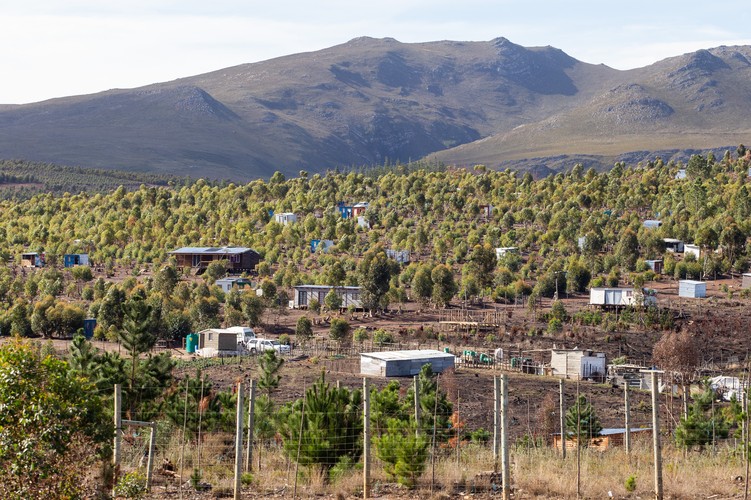Khoisan occupation in Grabouw is no longer our problem, says forestry department
The settlement called Knoflokskraal is to be managed by departments of Public Works and COGTA
The Department of Forestry, Fisheries and the Environment will no longer manage the settlement at Knoflokskraal. Archive photo: Ashraf Hendricks
The Department of Forestry, Fisheries, and the Environment (DFFE) has officially bowed out of managing a Khoisan settlement named Knoflokskraal in Grabouw, Western Cape.
The DFFE had managed activity at Knoflokskraal since late 2020. GroundUp first reported on the occupation of the 1,800 hectares piece of land in June 2022. The original occupiers, who moved onto the land in 2020, planned to establish a self-sustaining Khoisan community.
Since then, the occupation has grown and houses about 4,000 people. The land is owned by the Department of Public Works. In September, the DFFE said it planned to hand management of the land back to Public Works because it had failed to come to an agreement with the residents.
In October 2022, the then Public Works Minister, Patricia de Lille, told MPs that the department had spent R3-million on Knoflokskraal, including legal fees and sheriff’s costs in the bid to evict the occupiers.
During the previous parliamentary briefing in March 2023, the Theewaterskloof Municipality told MPs that it did not have money to provide basic services like water and toilets to residents of Knoflokskraal.
On Tuesday 18 April, the MPs in Parliament’s Portfolio Committee on Forestry, Fisheries, and the Environment adopted a report recommending that Knoflokskraal be managed by the departments of Public Works and Infrastructure and Cooperative Governance and Traditional Affairs (COGTA). The report also recommended the establishment of a community policing forum and resolution of problems with leadership at the occupation.
According to the department’s report, the land has become “unsalvageable” for future forestry purposes and there has been “irreversible damage to the plantations”.
In its report, the DFFE made several recommendations. One of them is that COGTA oversees the implementation of the Traditional and Khoi-San Leadership Act at Knoflokskraal. This would ensure that the community could set up a recognised council and become members of the National House of Traditional Leaders.
Another recommendation was for the South African Police Service (SAPS) to set up a Community Policing Forum “that will be inclusive of the affected communities to mitigate against conflicts between the police and the community”.
DA MP David Bryant recommended that a comprehensive report be requested from the South African Human Rights Commission, saying that its reply last month to Parliament on the occupation was “woefully inadequate”. This recommendation was adopted by other MPs.
The DFFE concluded in its report that it had “no further oversight role” over Knoflokskraal.
Support independent journalism
Donate using Payfast

Don't miss out on the latest news
We respect your privacy, and promise we won't spam you.
Next: Returning refugees swell numbers at Wingfield camp, with no solution in sight
Previous: Twitter threats to litigants in Zimbabwean Exemption Permit court case
© 2023 GroundUp. This article is licensed under a Creative Commons Attribution-NoDerivatives 4.0 International License.
You may republish this article, so long as you credit the authors and GroundUp, and do not change the text. Please include a link back to the original article.
We put an invisible pixel in the article so that we can count traffic to republishers. All analytics tools are solely on our servers. We do not give our logs to any third party. Logs are deleted after two weeks. We do not use any IP address identifying information except to count regional traffic. We are solely interested in counting hits, not tracking users. If you republish, please do not delete the invisible pixel.

